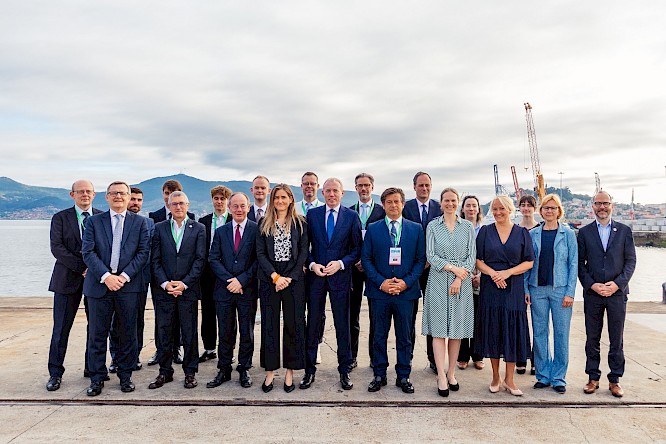Ministers meet in Vigo to take concrete measures to enhance protection of the North-East Atlantic Ocean
Press Release
Embargoed for release at 1300 (CEST)
27 June 2025

Ministers meet in Vigo to take concrete measures to enhance protection of the North-East Atlantic Ocean
Vigo, Spain – Ministers and senior representatives from the 16 Contracting Parties to the OSPAR Convention gathered today in Vigo for a landmark OSPAR Ministerial Meeting. In the aftermath of the United Nations Oceans Conference in Nice, OSPAR countries adopted a series of collective actions that show multilateralism and international collaboration at its best.
Hosted by the Spanish Government, the meeting marked a critical midpoint in the implementation of the North-East Atlantic Environment Strategy (NEAES) 2030, OSPAR’s roadmap for ocean health in the region.
At the heart of the meeting was the adoption of the Vigo Ministerial Declaration, an ambitious and shared political commitment to accelerate progress in response to the triple planetary crisis of climate change, biodiversity loss, and pollution. Contracting Parties reaffirmed that the OSPAR Commission not only has the mandate—but also the responsibility—to lead globally in the protection of the marine environment.
Key Outcomes from the Vigo Ministerial Meeting
- Reducing Pollution from Shipping: Expressing serious concern about hazardous discharges from all types of Exhaust Gas Cleaning Systems (EGCS) on ships, particularly in coastal zones, OSPAR agreed a staged ban on the release of discharge water from ships’ exhaust gas scrubbers in coastal waters. A roadmap to examine strengthening this by 2027 was also agreed.
- Expansion of the OSPAR Maritime Area: Ministers agreed to extend the OSPAR maritime area by over 2.5 million km² to include Macaronesian waters, encompassing the Azores, Madeira, and the Canary Islands. This historic decision brings these biodiversity-rich areas under OSPAR protection, recognising the critical importance of regional cooperation.
- Marine Litter Action: As part of OSPAR’s Regional Action Plan on Marine Litter, two new measures were introduced:
- A ban on plastic pollution from pontoons and buoys.
- Implementation of best practices to reduce marine litter across sectors.
- New Regional Action Plans on Underwater Noise and on Benthic Habitats.
- Strengthening Arctic Protection: Delivering on its 2021 commitment, OSPAR adopted measures to increase engagement with Arctic Indigenous Peoples Organisations in the Arctic and to begin identifying potential Marine Protected Areas and other effective conservation measures in Region I (the Arctic).
- Offshore Installations: OSPAR reaffirmed its 1998 Sintra Statement commitment to not treat the sea as a dumping ground and committed to reduce derogations from the requirement to remove disused offshore installations.
- Radioactive Substances: Two new OSPAR indicators were adopted on environmental concentrations of artificial radioactive substances, and on radioactive discharges from the nuclear sector.
- Future-Proofing the OSPAR Convention: Ministers launched a process to examine how the Convention can evolve to respond to new and emerging pressures, including offshore renewables, space launch debris, carbon dioxide capture and storage, hydrogen production linked to offshore oil and gas, and a clarification of provisions on land-based sources of pollution.
The meeting underlined OSPAR’s role as a leading regional ocean governance body, committed to science-based policy, international cooperation, and action at scale.
OSPAR Commission Executive Secretary, Dominic Pattinson, stated:
“The decisions taken today in Vigo reflect our shared commitment to protect our ocean through cooperation, ambition, and accountability. With these new measures, OSPAR continues to lead the way in regional marine protection.”
For more information, visit: www.ospar.org
ENDS

Contact: Dominic Pattinson (OSPAR Executive Secretary)
Email: [email protected]
Tel: +44 (0) 7494332213

